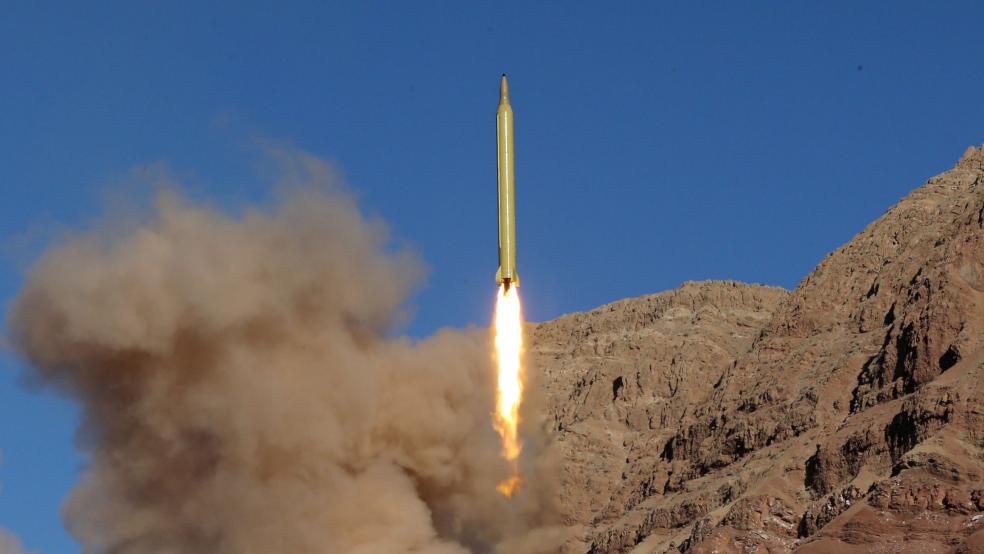Looks like Iran is next on the list of foreign-policy bad guys Team Trump has in its crosshairs. In an assertive statement Wednesday, Secretary of State Rex Tillerson didn’t invoke George W. Bush’s “axis of evil,” but he may as well have. Substitute Syria for Iraq and you’ve got the Trump administration’s version of Bush’s threesome.
“An unchecked Iran has the potential to follow the same path as North Korea and take the world along with it,” Tillerson said in a hastily called press conference at the State Department. “The United States is keen to avoid a second piece of evidence that ‘strategic patience’ is a failed approach.”
Related: Iran Confirms Missile Test, Drawing Tough Response From Trump Aide
Tillerson was especially critical of the Obama administration’s 2015 agreement governing Iran’s nuclear programs. Staying on message, he called it “the same failed approach to the past that brought us to the current imminent threat that we face from North Korea.”
That’s highly debatable but no surprise. During last year’s campaigns, Trump often termed the accord “the worst deal ever.” But here’s the reality: Scrapping that pact would be like pulling the keystone out of an arch: A big policy framework would collapse into rubble.
It has been a stunning couple of weeks since Trump announced that he was giving the Pentagon “total authorization” — effectively handing the Pentagon the lead in foreign policy.
First came the cruise missile attack on a Syrian airfield in response to another deployment of chemical weapons, a move applauded by democrats and republicans alike. Days later the Pentagon dropped its largest non-nuclear bomb on an ISIS complex in Afghanistan, delivering what is likely the first of many major blows to the terror group as Trump has promised.
The face-off in North Korea followed. The Pentagon and the White House somehow bungled the announcement, but the U.S.S. Carl Vinson, a carrier strike group, is headed toward Korean waters. The U.S. is now as close to open conflict on the Peninsula as it has been at least since the Clinton administration nearly tipped into war in 1994.
Related: Tillerson Accuses Iran of 'Alarming Provocations' as U.S. Reviews Policy
Now Iran is in the administration’s sights.
Team Trump may be moving too fast, and in a couple of cases too far. Iran could be one of them, depending on how drastically the Trump administration redraws current U.S. policy toward the Islamic Republic.
Tillerson is right that the terms of the 2015 agreement are narrow and omit many acts of aggression Iran may otherwise engage in. But as U.S. diplomats understood during negotiations, the accord would not have been signed otherwise.
The National Security Council is currently midway in a policy review of the nuclear deal as well as the sanctions that are now suspended. As of now, Iran has not violated the nuclear deal. But there’s a debate about whether Iran may have violated Resolution 2231, which restricts ballistic missile tests designed to carry nuclear weapons for eight years.
Iran claims the missiles are simply part of their national security arsenal, and that might be the case. Nevertheless, it could be argued that the continued missile test violates the spirit of the agreement and Resolution 2231. Should Trump look the other way like Obama did as Iran continues to test ballistic missiles? Or should he confront the Iranians by trying to re-impose the sanctions?
As much as Trump hates the Iran deal, I don’t believe he’ll risk reneging on the nuclear deal that five other nations negotiated and signed. Three of them—Britain, France, and Germany—are charter members of the trans–Atlantic alliance; all have signaled that they want this deal to hold, which brings relations with key allies into the picture.
Related: Iran Foreign Minister Says US Must Meet Own Obligations for Nuclear Deal
For another, Tehran and Washington are awkward but effective allies in Syria and Iraq. Iranian-backed militias have proven key to progress against the ISIS and other jihadist groups in both nations.
Tillerson’s timing also seems badly calculated. Iran is to hold a presidential election in mid–June, and Hassan Rouhani, the reformist who saw the agreement through against a lot of resistance from conservatives, is standing for another term. Sinking Rouhani’s signature achievement will strengthen the hand of precisely those in Tehran the U.S. wants least to see back in power. This is an open-and-shut certainty.
Only a day before Tillerson spoke, the State Department officially advised Congress that Iran was fully conforming to the nuclear accord’s terms. That seems to make the secretary’s timing doubly poor. But maybe not. All of the pact’s signatories are to meet in Vienna next week for an all-sides performance review. Tillerson may well intend just to prepare his ground so he can do some tough bargaining with allies as well as Iran.
The nuclear deal’s most committed advocates never argued it was perfect. It isn’t. But it’s there for a long time, and Tehran’s sticking to it. Is it in U.S. interests to tell Iran it can restart a program with the potential to make nuclear warheads? Where’s the gain in such a move?
The only move that could be made with impunity is to renew the sanctions. But why would Trump play a bargaining chip this early in the game?






